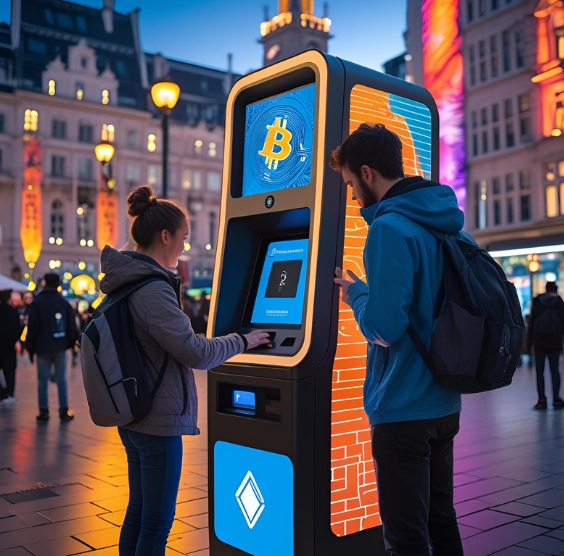Crypto ATM Fraud Prevention Act of 2025
- Nominis Intelligence Unit
- Aug 3
- 3 min read
Crypto ATM scams surged dramatically in recent years. According to the Federal Trade Commission (FTC), U.S. losses reached $66 million in the first half of 2024 and ballooned to $114 million for the entire year, primarily affecting seniors. The issue has become so prevalent that the Financial Conduct Authority (FCA) in the UK recently cracked down on crypto ATMs, closing 7 that were linked to illegal activity. In response to this growing fraud crisis, Senator Dick Durbin (D‑IL) introduced the Crypto ATM Fraud Prevention Act (S. 710) on February 25, 2025, with Senators Blumenthal, Reed, and Welch as cosponsors.

Key Provisions
The bill proposes a set of common-sense protections aimed at reducing crypto ATM related fraud:
Fraud warnings: ATM operators must display clear warnings about common scams and caution users not to send money to unknown contacts.
Anti-fraud policy: Operators must appoint a Chief Compliance Officer, implement a written fraud prevention policy, register with FinCEN, and provide live customer support during operating hours.
New-user limits: For customers within their first 14 days:
$2,000 per day,
$10,000 total,
Verbal live confirmation required for transactions over $500,
Full refunds of fraud reported within 30 days.
ATM registry and transparency: Operators must register ATM locations with the Treasury, update listings quarterly, and provide law enforcement contacts.
Traceable receipts: Every transaction must include a time, place, amount, hash, operator info, refund policy link, and law enforcement contact details.
Legislative Context & Support
As of now, the bill remains at the stage of being referred to the Senate Banking Committee. It has received backing from consumer advocacy and reform groups, ,including Americans for Financial Reform, Better Markets, Public Citizen, the National Consumer Law Centre, and AARP affiliates. Meanwhile, several states, such as Illinois, Vermont, Nebraska, Rhode Island, and Arizona, are already enacting similar regulations that cap transaction levels, mandate disclosures, provide refunds, or even ban crypto ATMs entirely in certain municipalities.
Why It Matters
With nearly 30,000 crypto ATMs now active nationwide, these unregulated kiosks provide scammers with rapid, irreversible ways to receive funds, often exploiting elderly or vulnerable individuals. The Act aims to introduce much-needed oversight and consumer protections in a sector where stolen transactions cannot typically be reversed.

While the Crypto ATM Fraud Prevention Act mandates receipts and reporting, KYT makes it actionable; providing real-time visibility and threat prevention capabilities that static compliance systems cannot. KYT platforms and AI-based systems are well-positioned to deliver plug-and-play fraud detection that ATM providers can integrate via API.
Final Thoughts
The Crypto ATM Fraud Prevention Act of 2025 is a bipartisan effort to establish federal safeguards around crypto ATM use, with a focus on protecting new and vulnerable users. By mandating fraud warnings, transaction limits, transparency measures, and refund mechanisms, the legislation aims to reduce escalating scam losses and strengthen law enforcement response.
Integrating KYT enables real-time risk detection, allowing ATM operators to proactively block suspicious activity, protect users, and build lasting trust at the intersection of cash and crypto.
Crypto ATM Fraud: FAQs
Q: What is a crypto ATM?
A crypto ATM is a physical kiosk that lets you buy or sell cryptocurrency using cash or a debit card, similar to a traditional ATM, but for digital assets like Bitcoin. Some machines allow only purchases, while others support both buying and selling.
Q: Why are scammers using crypto ATMs?
Scammers prefer crypto ATMs because transactions are fast, irreversible, and often require minimal identity checks. Victims are tricked into sending money directly to a scammer’s wallet by scanning a QR code or entering a wallet address at the machine.
Q: Is it safe to use a crypto ATM?
It can be safe if you use trusted operators and know who you're sending funds to. Always double-check wallet addresses, avoid sending crypto to strangers, and look for fraud warnings on the screen. If something feels off, stop the transaction and contact support.
While we strive for accuracy in our content, we acknowledge that errors may occur. If you find any mistakes, please reach out to us at contact@nominis.io Your feedback is appreciated!


